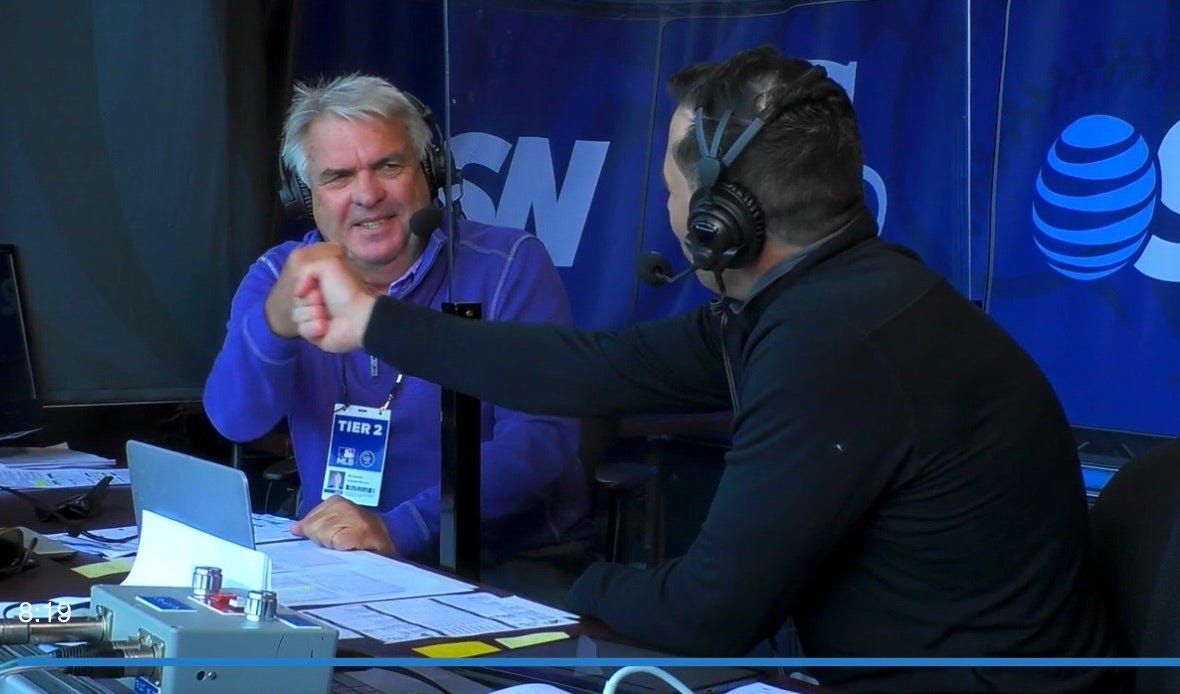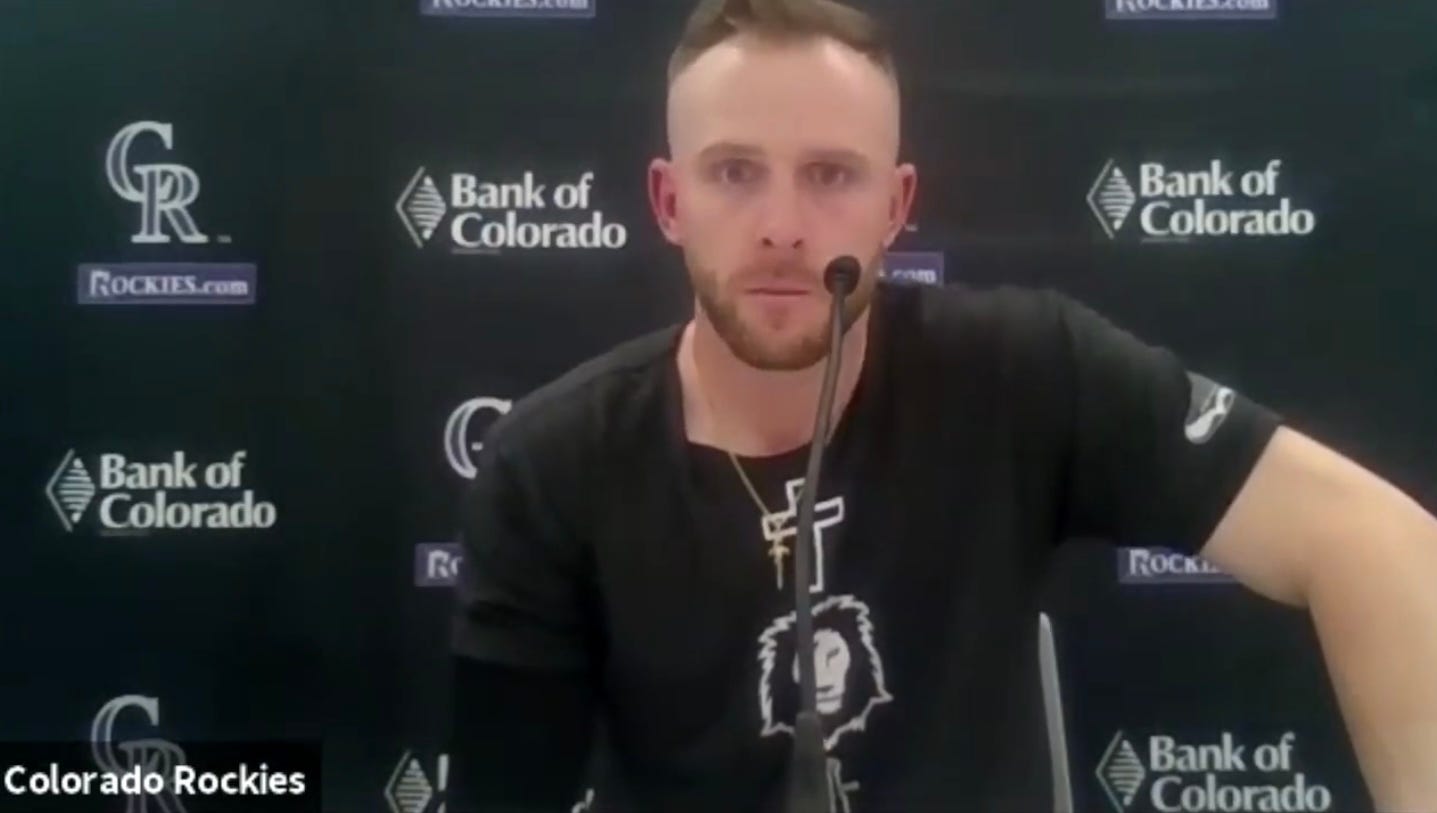• Archive: A Few Thoughts on the End of the Rockies’ 2021 Season
The Rockies weren’t very good, but a lot happened.
Oct 4, 2021
Yesterday, the Rockies’ 2021 season came to a close. During one of the most exciting final days of the regular season in recent memory, the Rockies were playing meaningless baseball in a half-empty Chase Field.
Anybody else as pumped as I am for the Rockies Diamondbacks game?
(To be clear, Bay is an avid Dodgers fan, so his tone is sarcastic.)
The Rockies finished with a record of 74-87, (48-33 at Coors Field; 26-54 on the road). They were better than a lot of pundits thought they would be, but the last three years have shown the Rockies to be a 70-win team, not a serious playoff contender, despite ownership assessments like this: “I truly in my heart believe that this is a very talented team that underperformed the last couple of years.” The “guys playing better” strategy has been remarkably consistent— and not in a good way.
The offseason in baseball is about autopsying what has happened with an eye to next year. I enjoy those kinds of exercises, and I’ll be started by the end of the week. First, though, I wanted to take a moment and consider what happened this year, especially in light of the Rockies’ (unsurprising) decision to name Bill Schmidt permanent general manager. Despite their record, it was a big year for the Rockies.
Here’s some of the news from 2021.
- Jeff Bridich Resigned, and Bill Schmidt Became General Manager — No one was surprised by the decision, especially given that it came in a highly insular organization. Generally speaking, it was not well received:
Former MLB Executive on #Rockies hiring Bill Schmidt as GM.. “Confirms their total lack of self awareness along w/extending their prevailing ineptitude by design. They didn't even seek outside opinions & methodology. It's baffling to the baseball world, absolutely inexplicable!”
I’m ambivalent about Schmidt being named general manager. As someone who’s spent time working in situations without clear leadership, I’m sympathetic to a group saying, “We can’t handle more change. Just give us stability for awhile.” Apparently, for the Rockies, Schmidt has done that.
In addition, we know that the Rockies were hemorrhaging staff. Schmidt has begun filling positions left vacant, including hiring Scott Van Lenten to oversee research and development. None of this is sexy or revelatory, but stability matters.
(If you’re interested, there’s a link to Bill Schmidt’s interview with Jack Corrigan here.)
Moreover, I remain convinced that the Rockies are an organization operating under “The Plan” Jeff Bridich devised. That may explain Schmidt’s open-ended contract. Since The Plan ends when the starting rotation is no longer operable, the occupant of Jeff Bridich’s office is less important. (To be clear, the initial results have been mixed.)
I would also assume that Bridich’s leaving was less a firing than an expression of dissatisfaction at Dick Monfort’s decision to promote Greg Feasel. The timing suggests the two were not a coincidence. Moreover, I suspect the #FireBridich campaign got to him. He hadn’t seemed happy for a long time.
But anyone who thinks the Bridich Years are over is being premature. It takes time to assess leadership effectiveness and evaluate the fallout from decisions made by a previous administration. In the fall of 2009, I remember a student telling the library director (who also has a PhD in history) that he wanted to write his research paper on whether Barack Obama was a good president. Susan explained to him that decades pass before it’s possible to evaluate a president — they’d only just received Bill Clinton’s papers the previous month. That’s going to be the case with Jeff Bridich. We know he was a terrible communicator, and we know he was bad at signing free agents, but we won’t understand his legacy for awhile.
- Nolan Arenado Was Traded — We knew Arenado was unhappy, and in February, he punched his ticket out of Colorado. For fans, it was distressing for a number of reasons: A lack of closure; the loss of the face of the franchise and a generational talent; questions about the return the Rockies received; and a revelation in the national media of the Rockies’ front office incompetence. Arenado sent the fans a goodbye video, but it was hard. Without Arenado, who were the Colorado Rockies? It also showed how little the Rockies understand their fans.
Speaking for myself, I found Arenado’s return to Coors Field for the All-Star Game deeply satisfying — and I feel like when he took the field and I got to give him a standing ovation, I was through it. (Fandom is a weird relationship.) Emotion aside, Arenado’s exit from Colorado fundamentally changed the franchise.
- The All-Star Game Came to Coors Field — It was unexpected (and surely a cash cow for the Rockies and McGregor Square). It was also a very big deal — albeit hastily thrown together. (Someone, please, explain those uniforms. They still don’t make sense outside of Atlanta.) Seeing Arenado and Germán Márquez support Trevor Story in the Home Run Derby was very cool, and that moment when Márquez pitched with Arenado picking up a ground ball and firing it to first was pretty special, too. I feel like we earned that, and we only got that moment because of a series of actions that were unplanned when the season began.
For a week, the baseball world revolved around Denver.
- Larry Walker Entered the Hall of Fame — The Rockies finally have a presence in Cooperstown, which is pretty terrific. In addition, the Rockies celebrated Walker’s career and retired his number (which was probably a good way to fill Coors Field at the end of the season when the team was out of the playoff chase).
“I want you to view that plaque with a certain amount of pride,” Walker said during his Coors Field speech. “I want you to see it with your face on it, not mine. . . . Today I don’t say I have a plaque in Cooperstown, I say WE have a plaque in Cooperstown.” Everything about Larry Walker’s HOF induction was a big deal.
- Trevor Story Is (Probably) Done as a Rockie — All that was missing from Nolan Arenado’s Colorado exit happened for Trevor Story. The last week of the Rockies’ season felt like an ongoing eulogy. He addressed fans; he gave away his Rockies gear; he was emotional about leaving his teammates. In the way that the hiring of Bill Schmidt provided a strange parallel to Jeff Bridich’s early-season exit, Trevor Story’s final games with Colorado framed a season that began with the Arenado deal.
The Rockies’ handling of Arenado and Story also raised similar questions about the front office’s ability to manage a professional baseball team.
- Fans (Kind of) Came Back to Coors Field — Nick Groke made an important pointabout this in The Athletic last week:
Fans did turn out to Coors Field this season, even as their team faded from contention. After the Rockies opened for full capacity on June 28 against the Pirates in a kind of second swing at Opening Day, they averaged 30,263 fans the rest of the season. A persistent pandemic kept crowds down across baseball, it seemed, but for the Rockies, their attendance dipped.
Over the same time period in 2019, the last time Coors Field was open for full capacity, the Rockies averaged 38,525 fans, even as they again faded from contention. Their 2021 attendance amounted to a 24 percent full-capacity decrease. Two years ago, the Rockies ranked sixth in attendance in the majors. Even after their slide, and even though an accurate, league-wide accounting is difficult this year, the Rockies probably finished among the top 10 in attendance. Coors Field remains a draw.
Turns out, there’s a cost to fielding a marginal baseball team.
- A Thought About Dick Monfort and Fans — I’ve come to wonder if Dick Monfort has become fan shy. This was brought home to me while watching the Larry Walker festivities when an unannounced Dick Monfort made his way to the podium to give a speech. He did this, presumably, not because of an error in the program but rather to decrease the chances of fans booing him. (I’ve heard from some who were at the game they were prepared to do so.)
If that’s the case, and if Monfort is, indeed, susceptible to fan criticism, then perhaps fans have found a pressure point that would work better than attendance boycotts.
Just a thought.
With that, now that we have all the data, it’s time to autopsy 2021 and begin planning for the future. These were just a few points outside the numbers that felt worth revisiting.
So, when do the Winter Leagues start?
Thank You for Reading
September 26 marked the first anniversary of Rockies Pitch, and I wanted to thank you for subscribing to this newsletter, reading it, recommending it, and making suggestions for improvement. Everyone has too much stuff to read, so I appreciate this newsletter being added to your inbox.
When I started Rockies Pitch, I told myself if I had 30 readers who appreciated the content, that would be enough. I passed that goal early on, and the numbers have surpassed my expectations. Excessive thanks can become maudlin, so I’ll stop now, but always know that I am grateful.
Look for the regular Rockies Pitch on Friday.
Renee

 Max Bay @choice_fielder
Max Bay @choice_fielder Eric Goodman @EricGoodman
Eric Goodman @EricGoodman




